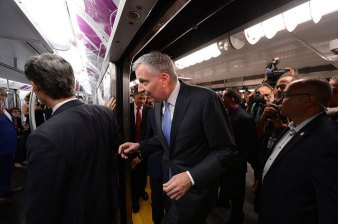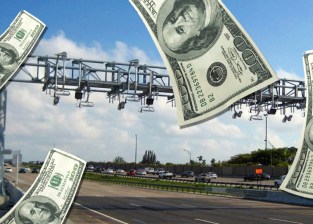Congestion Panel Considers Shrinking Zone and Tolling Bridges
The Traffic Congestion Mitigation Commission wants to reduce the size of the proposed congestion pricing zone, replace cameras with higher parking fees, and possibly toll the East River bridges, according to a (subscription only) story by Erik Engquist in Crain’s New York Business today.
A few of the steps under consideration:
- moving the northern boundary from 86th Street to 60th Street;
- "drastically" reducing the number of cameras to cut administrative costs and "mollify civil libertarians";
- retooling the toll offset proposed for New Jersey drivers;
- tolling the East River bridges (over the objection of Brooklyn Borough President Marty Markowitz).
The Daily News says the panel is also thinking about eliminating the $4 fee for trips within the congestion zone, and creating additional, smaller zones in downtown and Midtown.
This sentence really jumped out of Engquist’s article:
In place of cameras, much higher fees for on-street parking, and perhaps a new tax on garage parking, would be imposed to raise revenues and discourage driving in the central business district.
So, what does that mean? Is the Commission considering replacing congestion pricing (as defined by the federal government) in favor of more stringent and expensive parking policies? If so, will the feds still give New York City a $354.5 million grant for that?
For a refresher on the hows and whys of the original pricing proposal — which addresses many, if not all, of the commission’s concerns — see Streetsblog’s four-part interview series with PlaNYC architect Rohit Aggarwala.
In the meantime, here’s the Crain’s article in its entirety.
Traffic plan detour
Congestion panel may move boundary, make other changes to win support
BY ERIK ENGQUIST
The commission reviewing Mayor Michael Bloomberg’s congestion pricing proposal is likely to overhaul it by moving the northern boundary from 86th Street to 60th Street and simplifying enforcement.
According to people involved in the process, members of the panel believe the changes are necessary because polls and hearings show that support for the plan is shaky and hinges on whether it would generate enough mass-transit funding.
"Because of the public hearings and the issues raised by the Assembly and others, a whole range of issues is being looked at," says Marc Shaw, chairman of the commission. "The overall desire is to find a way to reduce congestion and do it in a way that doesn’t have a negative impact on the economy."
The 17 commission members, appointed by city and state lawmakers, are expected to make other changes as well to increase revenues, make the fee scheme fairer to city drivers and ease privacy concerns.
The panel is awaiting projections on the impact of possible changes but appears certain to drastically reduce the hundreds of cameras proposed, many of which were to be used to track vehicles within the congestion zone. Shedding cameras would mollify civil libertarians and help slash administrative costs-initially projected to eat up 40% of revenues-to 25% or less, freeing up more money for transit projects. Better bus and subway service is essential to winning the approvals needed from the City Council and the state Legislature.
In place of cameras, much higher fees for on-street parking, and perhaps a new tax on garage parking, would be imposed to raise revenues and discourage driving in the central business district. A 60th Street boundary would eliminate the fee for drivers who stop short of midtown and ease fears that commuters would treat residential streets above 86th Street as park-and-rides.
The New Jersey problem
A thornier matter is how much to charge suburbanites who drive into the city, especially New Jersey residents, whose congestion fees would be entirely offset by their Hudson River tolls under the mayor’s plan. City lawmakers, whose support is crucial for any plan to be adopted next year, consider it unfair that revenues would come entirely from their constituents.
"Key issues for legislators will be [the amount of] revenues raised for the mass-transit budget, and equity," says Kathryn Wylde, who represents the City Council on the commission and is president of the Partnership for New York City. "They cannot swallow having some people pay a charge based on where they live, and other people, particularly non-New Yorkers, pay nothing."
But hitting toll payers with a congestion fee might discourage so many from driving that toll revenues would plunge for the Port Authority of New York and New Jersey, which operates the Holland and Lincoln tunnels, and the Metropolitan Transportation Authority, which runs other tunnels and bridges. Both authorities rely on toll money to fund debt obligations.
"It’s an issue," says Mr. Shaw, a former first deputy mayor for Mr. Bloomberg.
City, Long Island fight looms
The question of whether to let Long Island commuters avoid congestion fees could spark a battle between their Republican senators and Democratic Assembly members from the city. Under the Bloomberg plan, these drivers’ Midtown Tunnel tolls would offset their $8 daily fee.
Indeed, each modification to the proposal will threaten its delicate balance.
"Changing the plan will mean revisiting all the concessions and considerations involved with the MTA and Port Authority in particular, but also the state Department of Transportation, the state of New Jersey and the jurisdictions of Long Island and Westchester," says Ms. Wylde. "It’s just not that simple."
For example, tolling the East River bridges would sabotage pricing’s political support in Brooklyn. "I will not support any aspect of congestion pricing if tolling of the bridges is in it," says Brooklyn Borough President Marty Markowitz. "That’s off the table."
Nevertheless, Mr.Shaw says it "is something that’s being looked at."
State law requires the commission to finish its work by Jan. 31, so pressure will intensify in the coming weeks. "At some point, it has to be ‘Pencils down’ on the research," says commission member Andrew Darrell, regional director of advocacy group Environmental Defense. "And we’ll have to move forward with a plan."

